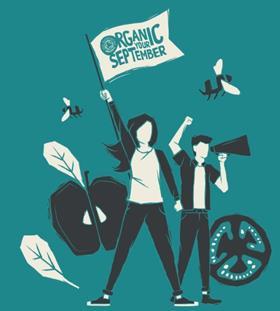
Before Manic October, Organic September. There’s something reassuring about the fact that Britain’s homegrown organic food will have a month of celebration ahead of what could be massive food supply chain disruption if the no-deal Brexit doom-mongers are to be believed.
Whatever happens, one thing is for sure: there is a clear opportunity for British-grown fresh produce, both organic and conventional, to seize the day and reduce the reliance upon imports. Whether that can be achieved will depend on market forces, the capability of growers to invest and the availability of workers to pick the crops.
From a sales perspective organic produce has had another encouraging year, with value sales up 6.9 per cent to £266 million and volumes up 5.9 per cent [Kantar] as new shoppers bought into the category and purchased more frequently. But life hasn’t all been straightforward, with mixed sales across the various fresh produce subsectors. Organic fruit is outperforming other categories, salads are growing and banana sales have seen a double-digit value uplift, but vegetable sales have taken a dip.
The price-cutting of conventional produce is also hindering sales of some organic fruit and veg, according to Finn Cottle, trade consultant at Soil Association Certification, as the on-shelf price difference widens. At a time when consumers are watching their pennies, that makes life tricky for the organic sector.
Organic does at least seem particularly well placed to take advantage of current consumption trends, especially those focused on reduced meat intake. “The trend towards flexitarianism and vegetarianism is providing a unique opportunity for organic fresh produce, as many of these shoppers are predisposed to choosing organic, whether it be for their daily smoothie or as substitutes in meat recipes,” Cottle says.
Cottle sees two major opportunities for organic produce. First, as fruit and veg becomes more popular, consumers are experimenting with more meat-free recipes, particularly as many are swapping out meat for environmental reasons. Secondly, as the convenience trend grows – IGD is forecasting the grocery convenience sector to grow to £48 billion by 2024 – there will be room for ‘partly prepared’ organic produce to fill a demand gap.
“Currently there are no organic fruit snacking products or organic prepared vegetables, so there is a great opportunity to meet the needs of shoppers who buy organic and also want more convenient options,” Cottle adds. The trend away from packaged produce and the growth in organic box schemes will also help.
If the sector can take advantage of these trends, those sales figures should very much continue in the right direction.
Organic prepares for month in the spotlight
This year’s Organic September is being billed as “a springboard for inspiration and action for fresh produce businesses.”
Soil Association Certification’s Finn Cottle explains: “By growing, producing, eating and buying organic we’re all part of the organic movement that is creating change in agriculture. As organic businesses, you are already champions of the movement, and an easy way to get involved is simply to tell the story of your business and how you are enabling sustainable change, helping shoppers to connect with where their food comes from and be inspired to make decisions that support sustainable ways of farming.”
To help, Soil Association Certification has developed a digital toolkit with ready-to-use social media posts, web and email assets, and Organic September branding. There’s more information at https://www.soilassociation.org/organicseptemberlicensees.



